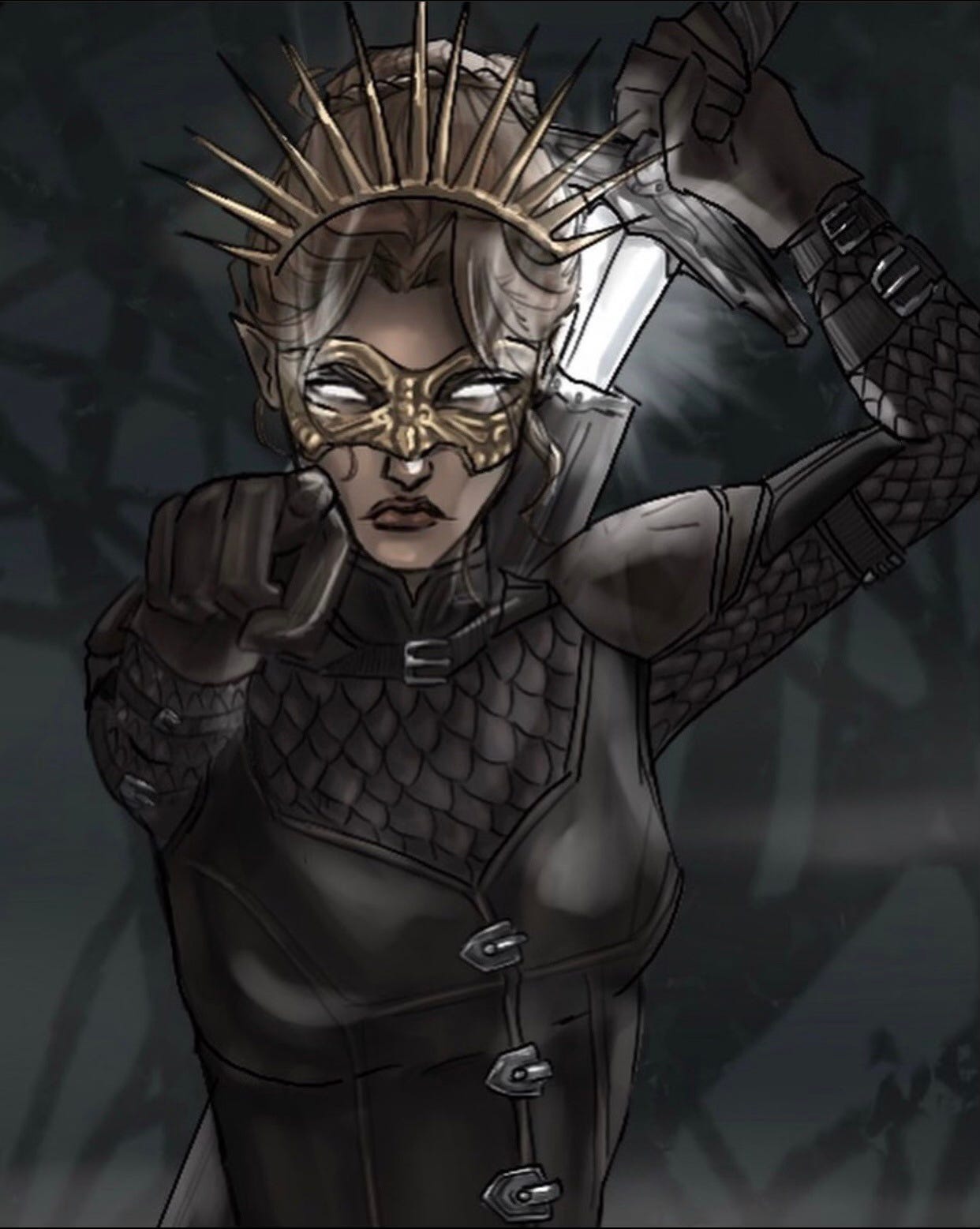TLDR: Hot Take: Hating Nesta Archeron is a red flag 🚩
Everyone wants a complex character, but then they hate Nesta?! Make it make sense.
One of the most divisive figures in A Court of Thorns and Roses (ACOTAR) series is Nesta Archeron, the eldest Archeron sister. For some readers, Nesta is an unlikable character. But for others, the knee-jerk hatred she receives is seems unwarranted.
If you have ever been depressed and angry and filled with rage, you have been a Nesta. It’s just a very real and raw character, and being able to see the depth of her pain and her rage, and her agony is very therapeutic. I have seen people before say that they think her character was unnecessary to learn more about, and I could not disagree more. I cannot imagine reading and having a side character that’s filled with that much anguish and intrigue and have that much complexity behind them and not want to know more.
Nesta is unapologetically angry, and stubborn. She lashes out at others and walls herself off emotionally. Yet, these traits don’t exist in isolation. They stem from her trauma, guilt, and deep-seated insecurities. It’s worth asking why characters like Rhysand, with his morally gray actions, are lauded as "complex," while Nesta’s flaws earn her outright scorn. The Nesta haters will excuse Rhys for twisting Feyre’s broken arm, drugging her, putting her life in threatening situations, stripping her of her bodily autonomy, etc., but Nesta being mean is inexcusable to them? Is it because she’s a woman who refuses to make herself palatable?
Nesta is a powerful woman, both literally and figuratively. As a High Fae with a unique connection to the Cauldron, she exudes power that unsettles those around her, even Rhysand. But it’s not just her power that intimidates others; it’s her refusal to conform. Nesta doesn’t try to soften her edges or make herself likable, which often makes her a target for criticism.
Society often demands women, fictional or otherwise, to be nurturing, forgiving, and self-sacrificing. When female characters like Nesta resist these expectations, they’re vilified. Loving flawed male antiheroes while hating female ones reeks of a double standard. Hating Nesta could indicate discomfort with women who own their power without apology. It’s a reflection of the societal tendency to fear strong, unyielding women.
Hating Nesta often comes down to misunderstanding her trauma. She survived the abuse from her mother and grandmother, being groomed at a young age to bring fortune for her family, the loss of her family’s fortune, sexual assault, the horrors of war, and being forcibly Made into something she didn’t want to be. Her coping mechanisms, while destructive, are relatable for many who’ve experienced mental health struggles. Yet, instead of recognizing her pain, critics dismiss her as “ungrateful” or “toxic.”
Take Cassian, for example. His rage and brutality in battle are often dismissed as justified because he is avenging his mother, who was murdered by Illyrians when he was a child. His tendency to provoke and escalate fights is seen as an extension of his loyalty and warrior nature. But when Nesta lashes out—despite having endured years of emotional neglect, being forced into a war she wanted no part of, and having her very body altered against her will—she’s labeled as cruel and irredeemable. Cassian is allowed to have his pain manifest in anger, but when Nesta does the same, she’s “toxic” and “abusive.”
Rhysand is often given a free pass for his more questionable actions because everything he does is framed as being for Feyre’s safety or the good of the Night Court. He lies, withholds information, and makes decisions on Feyre’s behalf, yet these actions are defended because he was under pressure and trying to protect the people he loves. Nesta, meanwhile, is torn apart for pushing away the people who care about her, even though her avoidance and self-destruction stem from the same place: trauma, guilt, and a deep sense of unworthiness. If Rhys is allowed to make hard choices for the sake of love, why isn’t Nesta granted that same grace?
The truth is, Nesta’s treatment by the fandom mirrors how society often vilifies “difficult” women—especially those who do not fit into traditional, palatable ideas of femininity. She is not soft, not immediately likable, and she does not beg for forgiveness. But that does not make her undeserving of it. If Cassian, and Rhysand are allowed to be flawed, to grow, and to be loved despite their mistakes, then Nesta should be, too.
If you argue that trauma does not excuse a character’s actions, that standard must be applied universally. Singling out Nesta while excusing others for similar behavior is inconsistent. If trauma is a valid explanation for some, it should be for all, regardless of personal bias. Holding Nesta accountable while overlooking the same actions in other characters is unfair. No one’s struggles should be dismissed while others receive a pass for going through hardship. True fairness means applying the same expectations to everyone. If Nesta’s trauma doesn’t justify her mistakes, then no one else’s should either, otherwise, it’s hypocrisy driven by preference rather than principle.
Nesta’s journey is one of healing, and that process isn’t linear or pretty. Her anger, defensiveness, and mistakes make her more human, not less. Her arc is also one of the most compelling redemption stories in the series. It’s not just about overcoming challenges, it’s about taking ownership of her life and choices. Nesta confronts and fights her demons, works tirelessly to rebuild her sense of self, and learns to open her heart to those who care about her.
This growth is far from instantaneous. It’s marked by setbacks and difficult moments that make her triumphs all the more rewarding. She doesn’t just heal for others; she does it for herself. Her journey reminds us that healing is a deeply personal and often messy process, but one that’s always worth pursuing.
To hate Nesta despite her growth is to ignore the beauty of her transformation. It’s also a missed opportunity to reflect on how real-world trauma and healing rarely fit neatly into a perfect arc.
This might be a hot take, but Nesta isn’t inherently mean, she’s just blunt. She speaks her mind and doesn’t sugarcoat her words, which can come off as harsh to those unaccustomed to such directness. A majority of the time, her so-called “meanness” is reactionary. She defends herself when attacked and calls out behavior she perceives as rude or foolish. Rather than being cruel for the sake of it, her bluntness is a shield, it’s a way to protect herself in a world that has often shown her little kindness. Recognizing the difference between being blunt and being truly mean is crucial in understanding her character.
Ultimately, the visceral hatred some feel toward Nesta Archeron often says more about them than it does about her. It might reflect internalized misogyny, discomfort with female anger, or an inability to empathize with someone’s pain when it’s expressed in ways that aren’t palatable. I’ve been hurt by a Nesta, and I’ve been a Nesta. I can confidently say that the people who hate her are perpetual victims and incapable of healing.
Loving or hating a character is subjective, of course, but Nesta challenges readers to confront biases about femininity, trauma, and redemption. Her story is a reminder that healing is messy, strength isn’t always pretty, and women don’t have to be likable to be worthy of love and respect. If you find yourself hating her without nuance, it might be time to ask why. The hatred might not be about her at all.







besides idk she was pretty unlikable character in the starting books and was mostly boring. SJM just gave her strong powers and all and tbvh neglectful behaviour from grandma and mom ok? what about Feyre being neglected? Nesta only loved Elain and their father loved Elain, what about feyre?
umm she actually WAS mean. There's no sugarcoating that either and hating rhysand while defending nesta isnt it. Feyre didn't do her wrong